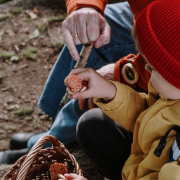Should Children Be Included in the Funeral?
As much as possible, parents want to shield their children from the harsh realities of life. Thus, when someone close to the family dies, you may be faced with the difficult decision of whether to let your children participate or miss out on the funeral and memorial services.
There’s no black-and-white answer for this question because many factors come into play like the child’s age, maturity level, and ability to understand the concept of death. If you’re stuck in a quandary wondering if you should let your children say their final farewell to a deceased loved one, these guidelines can help.
Make Sure Your Kids Don’t Feel Alone
When a child gets hurt, you give a kiss to make it feel better. The token kiss doesn’t make the injury go away, but it’s the first step to acknowledging the injury and its subsequent pain. As a result, the child feels care and comfort since an adult has taken charge. The kid feels good despite the pain knowing that he or she is not alone.
A funeral is akin to that kiss. When someone in your family dies, you need something symbolic like a kiss that says that life as you know it has changed. Gathering as a family for the funeral services gives you that opportunity to give comfort and accept care. Including the children will make them realize that you’re in it together and no one stands alone amidst the sadness.
Assess If Your Kids Are Ready
As a rule of thumb, if your children express interest in attending a wake, burial, or cremation do allow them to go. Older children can also express interest in helping with funeral planning. Coming together for these final rituals doesn’t only allow your children to receive comfort, but it’s their chance to say goodbye in their own way.
If your kids are still too young, you can decide for them because you have their best interest at heart. But if your children don’t want to attend the service, don’t force the issue. However, it is vital to communicate and ask why they feel this way. Talking about how they feel is a chance for you to answer questions or allay any fears they have surrounding death.
Prepare Children for the Event
If your children choose to be there for the final viewing and disposition, you have to tell them what they can expect during the services. As a parent, it’s your job to help them prepare their emotions. Assuage anxieties by giving them a verbal walk through the funeral process. You can touch on the following points:
- What rituals they will see or hear during the services
- How other guests may react during the proceedings
- The feelings that may prop up
- Describe how the burial or cremation goes
Tell your children that it’s okay if they wish to cry. But if they don’t feel like shedding tears, that’s fine too because people react differently. Give extra attention and affection during the funeral services so the kids don’t feel neglected. It may also be helpful to make arrangements with an adult you trust so that your kids can readily leave the services if things get too intense for them.
Respect Children’s Choices
If your children are mature enough, ask them what they want. Give them the freedom to choose and respect what they say. They should never be forced to view the body or touch it to say goodbye. If they elect to see the deceased, describe ahead of time how the body may look and feel. It’s an opportunity to remind them that death is final so it’s their last time to see the deceased.
Some kids may prefer to touch the body one last time for various reasons. They may want to satisfy their curiosity, express their goodbye, or show their final affirmation of love. However, if the kids choose to keep their distance during the services, assure them the deceased is at peace.
Ask your kids if they have tokens they want to include in the ceremony. It may feel comforting for your kids to include a drawing or a letter in the casket. Some choose to have their gifts buried with their loved ones as well.
Speak with the Funeral Director
Finally, if children are included in the services, speak with your funeral director about how they can be accommodated in the venue. Perhaps there’s a private lounge where the kids can take a break or a nap. Maybe they will also allow you to bring snacks for the younger kids.
The adults at the helm of making the funeral plans should coordinate with the funeral director and the team to ascertain that proper preparations are made for the kids. After all, they, too, are experiencing loss.
Attending a funeral is not easy for adults and more so for children. But being there is a crucial step toward acceptance. If your kids wish to be there, let them. It’s the most healthy response to adjusting to the loss of a loved one.













